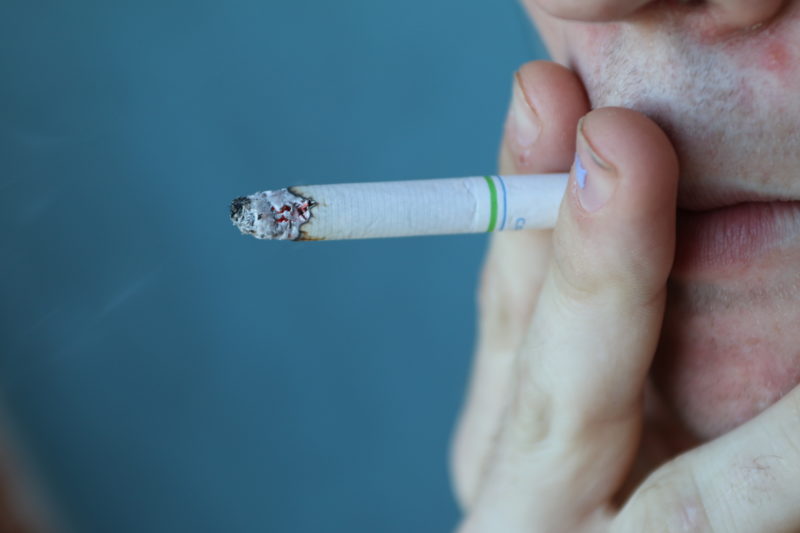As of Aug. 1, Trinity University enacted a new “Tobacco-Free” policy. Use of tobacco products, including cigarettes, chewing tobacco and e-cigarettes, are no longer allowed on any part of the Trinity campus. The policy applies not only to students, but to faculty and staff, as well as visitors to the campus.
The policy was put into place primarily to discourage students from smoking, to provide a supportive environment for those trying to quit smoking and to protect nonsmokers from secondhand smoke. Katherine Hewitt, coordinator of Wellness Services, has worked towards the tobacco ban for the past four years.
“It really picked up momentum about two years ago when Wellness Services was a new program for students. We needed more support staff to help with education of students with regards to the policy, and digging a little bit deeper into how to implement the policy,” Hewitt said.
The university realizes that banning tobacco is not enough to rid Trinity from smoking altogether. In addition to creating a tobacco-free environment that will discourage smokers, the university will continue to provide resources for those trying to quit.
“If they are not ready to quit, but need to be more comfortable during the day, we have nicotine replacement therapy available in Health Services. They would have to consult with a doctor or nurse to gain access to that, but it’s accessible,” Hewitt said.
The policy will be enforced primarily by a trained task force, rather than by Trinity University Police Department.
“We are treating it as if people just don’t know about it. We have trained people on a task force that are trained to approach someone who is violating the policy. Really calm, cool, collected way to talk to someone about the policy. We are still treating this as educational,” Hewitt said.
Although the task force will take an educational approach to offenders, this does not exclude any potential consequences for those who ignore the policy.
“If someone has been in violation several times, we will maybe make a referral to the Student Conduct Panel,” Hewitt said.
One major source of confusion for Trinity students is the policy’s stance on e-cigarettes and vaping. The policy bans vaping of all forms, including non-nicotine products. Sophomore Dominic Walsh argued for the merits of vaping as opposed to tobacco products like cigarettes.
“The gas that comes out of your mouth after you vape has been proven to be not harmful at all secondhand,” Walsh said. “A more appropriate response to the safety issue concerning tobacco would be to only allow vapes.”
Hewitt defended the inclusion of vapes in the policy.
“For the policy to have less loopholes, and to be as clear as possible, we included e-cigs and vaping in the policy. Just learning from what other campuses were doing, it seemed to be more of a streamlined and a smoother process if they included more versus less,” Hewitt said.
Hewitt also explained that the research surrounding vapes, especially as a smoking cessation tool, has not provided enough evidence for or against vaping.
“They are just so new, whereas there are 50 years of research about how unhealthy tobacco is, and we just thought it would be safer to go with a more comprehensive policy,” Hewitt said.
According to Hewitt, there are additional merits to Trinity becoming a tobacco-free campus.
“There’s opportunities that present themselves when you have a really strong policy, so for example, you can qualify for grant funding. You can shed light on your programs at conferences,” Hewitt said.
While money is a motivation, Hewitt spoke more on the effects of a tobacco ban on the health of the Trinity community.
“When people use tobacco products, it negatively affects their health, and in turn they could be missing work because of health problems, or they are not as productive because they take frequent breaks due to their addiction,” Hewitt said.
Secondhand smoke has also been a large issue on campus. Sophomore Lamonte Brooks says he suffered an asthma attack last fall due to secondhand smoke.
“I was walking to the library, while others were smoking in the area next to the library. The smoke triggered my asthma and my breaths became short. I was unable to breath as a result, and had an asthma attack, causing me to miss First-Year Experience to go take a nebulizer treatment,” Brooks said.
However, Brooks also finds the new policy to be too strict.
“Certain aspects of it could be deemed a bit extreme. Smoking is a tricky thing to tackle, as you want to come up with something that benefits all students, including those who do smoke,” Brooks said.
A major obstacle faced by Hewitt was student outreach concerning the policy.
“Over time to get the word out, to make it not look like we just flipped the switch, we’ve done a decent amount of outreach programs. We participated in the 1 Day Stand Against Tobacco program. We had ads on campus television, we do a lot of trainings with the residential advisors. We really try to communicate with every group we can get in front of,” Hewitt said.
However, Walsh said he thinks students still felt that they were not given enough of a voice on this massive policy change.
“There was only one town hall meeting,” Walsh said. “Generally, for a policy that affects this many students, it would be better to have more town hall meetings. And I think it wouldn’t be a bad idea for them to have another one this year to clarify some of their policies.”







